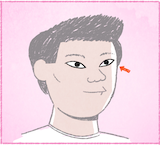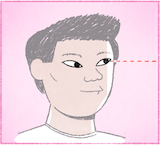



นี้คืออี่หยัง อันนี้เป็นตา อันนี้เป็นตาของคน
อยู่ในตากะสิมีน่วยตา น่วยตาสิเป็นสีดำ
ตาของคนสิเป็นสีขาว แต่ว่าน่วยตานั้นสิเป็นสีดำ
ตานี้ไว้ถ้าแนม ตาสามาดแนมได้ซู่อย่าง
ขั้นคนเฮาบ่มีตา กะบ่สามาดแนมได้ บ่สามาดเห็นฮุ่ง แนมอี่หยังกะบ่เห็น
ขั้นคนตาบอด กะบ่สามาดแนมเห็น บ่สามาดแนมได้จักอย่าง
แล้วพุซายคนนี้กำลังมืนตาอยู่ เขากำลังแนม กำลังแนมไปข้างหน้า
16
เขากำลังเฮ็ดหญัง เขากำลังแนม กำลังแนมไปทางซ้าย
กำลังแนมไปทางซ้ายอยู่ แต่ว่าเขาแนมอี่หยัง เขาใซ้ตาสองข้างของเขานั้นหละ กำลังแนมไปทางซ้ายอยู่
17
เขากำลังเฮ็ดหญังอยู่ เขากำลังหลับตา เขากำลังหลับตาอยู่
ขั้นคนหลับตาอยู่ หลือว่าหลับตาอยู่หนี้ สิบ่สามาดแนมอี่หยังเห็น หลือว่านอนหลับ
ขั้นคนนอนหลับกะสิหลับตา แล้วกะบ่สามาดแนมอี่หยังได้จักอย่าง กะคือหลับตาอยู่ ตาเฮากะสิปิด หลือว่าบ่ได้ใซ้งานตาแล้ว
18
เขากำลังเฮ็ดหญัง เขากำลังมืนตา
พุซายคนนี้เขากำลังมืนตาอยู่
เขาอาดสินอนตื่นแล้ว หลือเซาหลับตาแล้ว เขากะเลยมืนตาขึ้น เพื่อที่สิสามาดแนมได้ซู่สิ่งซู่อย่าง หลือว่าแนมเห็นได้ทุกสิ่งทุกอย่าง
Link to overview page
Link to dictionary
| Isaan | Pronunciation | Tones | Thai | English/Notes |
|---|---|---|---|---|
| นี้ | ni: | HF | นี้ | 1. this 2. here |
| คือ | khʉ: | HR | คือ | 1. to be, to resemble, like, as 2. why {บักหล้าคือบ่เก็บโต่ะแน่ = [addressing a young boy] Why haven't you cleared the table?} |
| อี่หยัง | i:-yaŋ | H-M | อะไร | 1. what {นี้คืออี่หยัง = What is this?} {มื้อนี้เจ้าเฮ็ดอี่หยัง = What are you doing today?} {กินเข้างายกับอี่หยัง = What did you have for breakfast?} 2. something, anything, (in negations) nothing {บ่ต้องเฮ็ดอี่หยังอีกเลยนอกจากใส่ปุย = [we] don't need to do anything besides adding fertilizer} |
| อัน | an | M | อัน | 1. thing, object 2. general clf. for objects |
| เป็น | pen | M | เป็น | 1. to be, to exist 2. to be able to 3. to suffer, sth. happens to 4. เป็นหญัง[...]คือ in initial position: why? {เป็นหญังเขากะคือแปงฟัน = Why is he brushing his teeth?} {เป็นหญังเคี่ยงบินมันคือสิตก = Why is the airplane falling down?} |
| ตา | ta: | M | ตา | eye {เขามีตาสองข้าง = he's got two eyes} {หลับตา = to close one's eyes} |
| ของ | khɔ:ŋ | M | ของ | of, belonging to |
| คน | khon | HR | คน | person, people |
| อยู่ | yu: | H | อยู่ | 1. to be (located) at 2. yet, still 3. auxiliary indicating continuous or progressive action {ทอดปาอยู่ในกะทะ = (in the process of) frying a fish in the pan} {แม่กำลังเมี้ยนเฮียนอยู่ = mother is cleaning/tidying up the house} |
| ใน | nai | HR | ใน | in, within |
| กะ | ga | M | ก็ | 1. then, consequently 2. also |
| สิ | si | M | จะ | future tense auxiliary {เขากำลังสิตื่น = he's about to wake up} {สิไปตะหลาด = [I'm] going to the market} |
| มี | mi: | HR | มี | 1. to have 2. there is |
| น่วยตา | nu:ai-ta: | H-M | ลูกตาดำ | pupil |
| สี | si: | M | สี | 1. color 2. colored pencil, crayon |
| ดำ | dam | M | ดำ | 1. black 2. to transplant rice seedlings {ดำนา = to transplant rice seedlings} |
| ขาว | kha:o | M | ขาว | white |
| แต่ว่า | tɛ:-wa: | H-H | แต่ว่า | 1. but 2. only {ฮู้แต่ว่าเขายืนอยู่พุเดียว = I only know that he's standing there by himself} |
| นั้น | nan | HF | นั้น | that, there |
| ไว้ถ้า | wai-tha: | HF-LF | usually in a positive statement or answer: is for, is used for, has the purpose of {กะทะมีไว้ถ้าทอด = a pan is for frying} {น้ำบักนาวมีไว้ถ้าปุงอาหาน = lime juice is used to season food} {ปากกามีไว้ถ้าเขียน = a pen is for writing} {กะเทียมเอาไว้ถ้าเฮ็ดแนวกิน = garlic is used to make food} {ขาเอาไว้ถ้าญ่าง = legs are for walking} {เกิบเอาไว้ถ้าใส่ = shoes are for wearing} Notes: see also ไว้ |
|
| แนม | nɛ:m | HR | มอง | to look, to glance, to stare {เขากำลังยืนแนมก้อนหินอยู่ = he's standing and looking at the stone/rock} {ข้างหนึ่งแนมเห็น อีกข้างหนึ่งแนมบ่เห็น = [we] see one side, [we] can't/don't see the other side} |
| สามาด | sa:-ma:t | M-HF | สามารถ | can, to be able |
| ได้ | dai | HF | ได้ | 1. can 2. to get, to obtain 3. before verb: indicating past tense 4. บ่ได้ + verb: not |
| ซู่ | su: | H | 1. all, entire 2. every, any {ซู่พุซู่คน = everybody} {ซู่สิ่งซู่อย่าง = everything} {ไก่ต้องกินเข้าซู่มื้อ = chicken need to eat every day} {ซู่คนสิมีขาเอาไว้ถ้าญ่าง = everybody has legs to walk} |
|
| อย่าง | ya:ŋ | H | อย่าง | type, kind, sort, category |
| ขั้น | khan | LF | เมื่อ | when, if |
| เฮา | hao | HR | เรา | 1. personal pronoun: we 2. personal pronoun: I |
| บ่ | bɔ: | H | ไม่ | 1. no, not 2. question particle, transforming a statement into a question Notes: spelling exception in line with common usage on social media |
| เห็น | hen | M | เห็น | to see |
| ฮุ่ง | huŋ | H | 1. light (adj), bright 2. to have light, to be not dark |
|
| ตาบอด | ta:-bɔ:t | M-LF | ตาบอด | blind |
| จักอย่าง | jak-ya:ŋ | M-H | (อะไร)สักอย่าง | something, anything {บ่สามาดแนมได้จักอย่าง = can't see anything} {บ่เหลียอี่หยังจักอย่าง = there's nothing left} |
| แล้ว | lɛ:o | HF | แล้ว | 1. finished 2. already 3. and then, and next (especially แล้วกะ) 4. auxiliary for past tense |
| พุซาย | phu-sa:i | H-HR | ผู้ชาย | man, male |
| กำลัง | gam-laŋ | M-HR | กำลัง | auxiliary indicating continuous or progressive action |
| มืน | mʉ:n | HR | ลืม, เปิด | to open (the eyes) |
| เขา | khao | M | เขา | personal pronoun: he, she |
| ไป | pai | M | ไป | 1. to go 2. auxiliary indicating action extending into the future |
| ข้างหน้า | kha:ŋ-na: | LF-LF | ข้างหน้า | in front, forward |
| เฮ็ด | het | H | ทำ | to do, to make |
| หญัง | ɲaŋ | M | อะไร, เป็นหญัง = ทำไม | 1. what {เขากำลังเฮ็ดหญัง = What is he doing?} {ธูปเอาไว้เฮ็ดหญัง = What are incense sticks for?} 2. something, anything, (nothing) 3. เป็นหญัง[...]คือ in initial position: why {เป็นหญังเขาคือใส่บักพิกลงไปในกวยเตียว = Why is he putting chili in [his] noodle soup?} {เป็นหญังหน้าต่างมันคือเปิด = Why is the window open?} {เป็นหญังมันคือมีควนไฟ = Why is there smoke?} |
| ทาง | tha:ŋ | HR | ทาง | 1. way, direction {พุหญิงกะสิไปทางหนึ่ง พุซายกะสิไปอีกทางหนึ่ง = the woman goes one way, the man another way} {ตะเว็นไปทางใด = Where has the sun gone?} {เขาถีบจักกะย๊านไปทางหน้า = he's biking on/onward/forward} {มาเว้า มาว่าเฮาในทางที่บ่ดี = he's scolding [me], he's talking to me improperly} 2. by, through, via etc. {เว้าทางโทละสับ = to talk on the phone} |
| ซ้าย | sa:i | HF | ซ้าย | left |
| ใซ้ | sai | HF | ใช้ | to use |
| สอง | sɔ:ŋ | M | สอง | two |
| ข้าง | kha:ŋ | LF | ข้าง | 1. side {มีหูจับสองข้าง = there are handles on both sides} 2. next to {วางอยู่ข้างๆ ก่องใบใหญ่ = it's placed next to the large box} {เขายืนอยู่ข้างๆ อีกพุหนึ่ง = he's standing next to another person} 3. clf. for body parts which come in pairs (eyes, ears, legs etc.) {เขามีตาสองข้าง = she has two eyes} |
| นั้นหละ | nan-la | HF-M | นั่นแหละ | auxiliary for emphasis at the end of a phrase |
| หลับ | lap | M | หลับ | 1. to sleep {นอนหลับ = to sleep (see separate entry)} 2. to close (the eyes) {หลับตา = to close one's eyes} |
| หลือ | lʉ: | M | หรือ | or |
| ว่า | wa: | H | ว่า | 1. that, as {คำว่า X = the word X} 2. to say |
| หนี้ | ni: | LF | นี่ | here |
| นอนหลับ | nɔ:n-lap | HR-M | นอนหลับ | to sleep |
| ปิด | pit | M | ปิด | 1. to close {ปิดปะตู = to close the door} {ปิดก่อกน้ำ = to close the tap} 2. to finish, to switch off {ปิดไฟ = to switch off the light} {ปิดวิทะยุ = to switch off the radio} |
| ใซ้งาน | sai-ŋa:n | HF-HR | ใช้งาน | to use, to put to use |
| อาด | a:t | LF | อาจ | 1. might, may, will 2. likely |
| นอน | nɔ:n | HR | นอน | 1. to lie down 2. to sleep |
| ตื่น | tʉ:n | H | ตื่น | to wake up |
| เซา | sao | HR | จบ | 1. to stop, to be finished {น้ำมันเซาไหลแล้ว = the water has stopped flowing} {ฝนเซาตกแล้ว = it has stopped raining} {มันสิเซาเสียงดัง = (phone) it stops ringing loudly} 2. to prevent, to hinder 3. to rest {เซาเมี่ยย = to rest} |
| เลย | lə:i | HR | เลย | 1. futher on, beyond, past {เข็มน้อยเลยเลขสิบสองไป = the minute hand has passed number twelve} 2. too much 3. at all 4. definitively 5. completely, utterly |
| ขึ้น | khʉn | LF | ขึ้น | 1. to go up, to increase 2. sun: to rise {ตะเว็นกำลังขึ้น = the sun is rising} 3. more 4. bus/train etc.: to get on, to board {พุโดยสานขึ้นลดไฟเบิดแล้ว = all passengers have boarded the train} |
| เพื่อที่ | phʉ:a-thi: | H-H | เพื่อที่ | in order to, so that Notes: the vowel เอือ is likely to be a Thai loan |
| ซู่สิ่งซู่อย่าง | su:-siŋ-su:-ya:ŋ | H-H-H-H | ทุกสิ่งทุกอย่าง | everything, all things/kinds/etc. |
| ทุก | thuk | H | ทุก | every Notes: also pronounced ทุ as in ทุมื้อๆ = everyday, always |
| สิ่ง | siŋ | H | สิ่ง | thing, object |